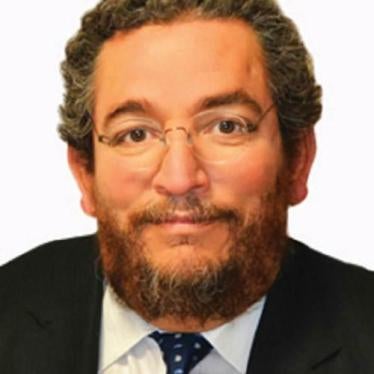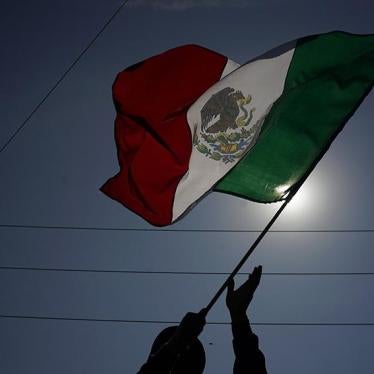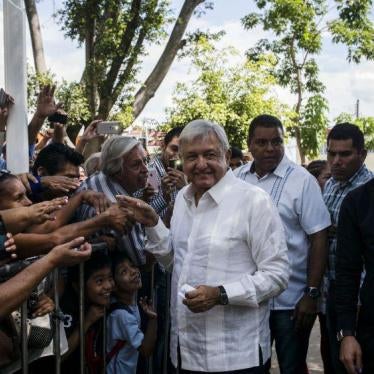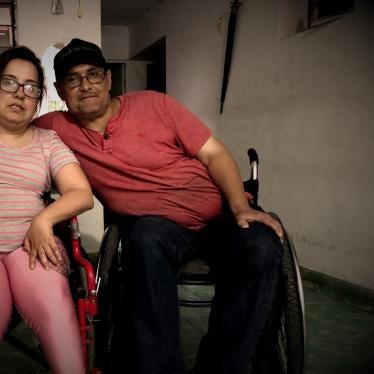(Mexico City) — A few weeks ago, a group of disability rights organizations and experts made a request to the Mexican government asking it to guarantee the implementation of disability rights. Doing this requires a state body that can monitor, coordinate efforts and force other government agencies to respect those rights. The response that we received was discouraging but also very revealing: "If I go to the president," said Mexico's Undersecretary of Welfare, "and I tell him that you want an agency, he'll tell me to go right back where I came from."
What we are asking for is not something excessive; it is the country's legal obligation. In 2007, Mexico ratified the International Convention on the Rights of Persons with Disabilities (CRPD), a UN international instrument that requires governments to set up a national agency to ensure that all state offices respect disability rights. The UN is calling for the creation of this agency because, as we can confirm, if governments do not pay particular attention to implementation and compliance with the treaty, people with disabilities will be left behind. That is exactly what has happened in Mexico.
The response from the public official in President Andrés Manuel López Obrador's administration helps us understand why: the 7.65 million people with disabilities in the country are not and have never been a state priority. Besides the fact that there are no public policies to ensure that people with disabilities can live independently and be included in society, there are two further realities that this government cannot ignore: over 54 per cent of people with disabilities in Mexico live in poverty and two out of every ten people with disabilities cannot read or write.
The new government has the opportunity to change that situation.
To do so, President López Obrador needs to give his full political backing towards creating an agency that guarantees disability rights or strengthening the body that already exists in Mexico, the National Council for the Development and Inclusion of Persons with Disability (CONADIS). Up until now CONADIS has not been effective in implementing national policies and programs to ensure the rights of people with disabilities, but it could be empowered to do so.
In 2014, the UN Committee that oversees the treaty urged Mexico to monitor compliance with accessibility laws and to establish a system for lodging complaints and imposing penalties for non-compliance. Five years later nothing has happened: Mexico is still a virtually inaccessible country, without uniform criteria in terms of accessible ramps to public and private buildings or full access to public transport. Most of the UN's 2014 recommendations to the Mexican government have still not been implemented.
And the current outlook is even gloomier: President López Obrador has calledfor dismantling Conadis and transferring its responsibilities to the Welfare Ministry. Although welfare and social programs are important for many people with disabilities, full implementation of protection for disability rights requires policies and measures that go beyond that individual government agency: responsibility is shared between various bodies because disability rights fall under several areas such as health, education, social welfare and justice. This is why we so urgently need an agency to coordinate those efforts and to take action against or sanction any ministries that are not meeting their obligations.
To achieve genuine and effective implementation of human rights, this task must be coordinated from within a government body. Passing laws, ratifying treaties or reforming the constitution is not enough.
In that sense, Mexico could follow the example of Denmark, which created a coordination body. Its role is to ensure that the various state agencies responsible for implementing disability rights meet their obligations. This has helped to create a system of transparency and accountability to better protect the rights of people with disabilities.
So the time has come to create that agency in Mexico and to give it the necessary independence and political backing so that all government bodies know that they are required to follow the guidelines and instructions of the national system for disability rights or face serious consequences.
Unfortunately, Conadis has lacked support from Mexican presidents, including President López Obrador, and, as an institution, suffers from significant shortcomings. Currently there is no obligation for Conadis to report on its results and that makes it hard to hold it accountable. Instead of breaking up Conadis, President López Obrador needs to take measures to remedy its flaws and strengthen it.
The time is now. President López Obrador's government needs only the political desire to consult the report of the Office of the United Nations High Commissioner for Human Rights, which insists that national implementing mechanisms like Conadis need to fulfill an essential function, namely to serve as a focal point for organizing policies and programs between the various state agencies.
The report recommends two decisive steps: firstly, the government needs to appoint liaison officers in all ministries and state agencies whose duties cover matters related to basic disability rights: work, education, justice, health and others. Secondly, the government needs to create an overall system of coordination in which all state agencies that deal with disability matters play a constant and active role. This would enable state ministries to draw up a structured and synchronized plan for implementing the rights set out in the treaty
The new administration has the opportunity to bring about real change in the lives of people with disabilities. The delay in doing so over the last decade is unacceptable but not doing so now will be wholly unjustifiable.








